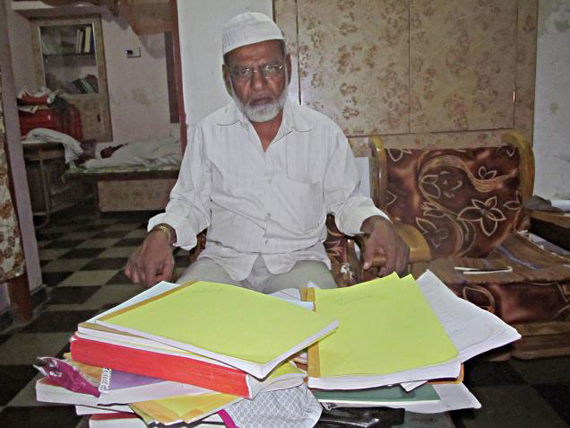
Bijapur, Aug 15: One more year passes by and 63-year-old Rajahmed Bagewadi’s hope to celebrate Id with his son is dashed. For five years, Mr. Bagewadi has been waiting for his son Mohammad Sami to return home from jail where he is incarcerated on terrorism charges.
The ageing but doughty father has relentlessly tried to get his son freed as he believes he has been wrongly implicated.
Sami (26), a student of B.E (Arch), was first arrested by the Bangalore police on September 13, 2008, and then by the Gujarat police on July 16, 2009, on charges of involvement in the serial bomb blasts in Bangalore, Ahmedabad and Surat in July 2008.
“Since my son’s arrest on September 13, 2008, I have not had a day’s peaceful sleep. Proving his innocence has become the only objective in my life,” he said.
Sami was released by the Special Court in Karnataka on November 12, 2011, as the investigating officer H.M. Omkaraiah said the police did not find any evidence against him.
Recalling the arrest, Mr. Bagewadi said: “We were all waiting to break fast on the evening of September 13. My son’s phone was switched off and we were unable to reach him. We contacted his college and the officials said Sami had been taken by the Bangalore police.”
“Sub-inspector Deepak, then with the Cubbon Park police station, had picked up my son,” the father said.
The police later seized his son’s camera, laptop and computer. Since then, Mr. Bagewadi, a retired senior auditor, has meticulously collected documents in an attempt to prove his son’s innocence.
“The police filed three charge-sheets; in the first my son was the first accused. A few days later, six more were arrested, and my son was pushed to seventh place in the list of accused. In the third, his name was deleted from the charge-sheet. Mr. Omkaraiah also submitted a report to the court explaining why charges against Sami were dropped,” he said.
The Special Court ordered Sami’s release on November 12, 2011. But by then, Sami had been taken from the Bangalore prison by the Gujarat police on July 16, 2009 in connection with the Gujarat blasts. From then until his release by the Bangalore court, Sami had attended all his hearings through video conference from Gujarat.
The Gujarat police told the court that Sami had been present in Gujarat in the last week of December 2007 to attend a meeting of conspirators linked to the blasts.
Mr. Bagewadi said his son had been home writing exams at the time. Getting details under Right to Information (RTI) Act from Visvesvaraya Technological University, he said Sami wrote exams on December 24, 29, and 31. “How can my son have been present at the same time in Bijapur and in Gujarat?” he asked.
Quoting from the charge-sheet, Mr. Bagewadi said while there are details alleging how the other accused were involved, there is no specific charge against Sami. “Though the Gujarat police say my son was present in the meeting, they have not submitted any documents to substantiate their claim,” Mr. Bagewadi said.
Sami’s lawyer Mehmood Pracha, a Supreme Court advocate and an Additional Advocate-General of Haryana in the apex court said he believes there is no strong evidence against Sami.
“The Gujarat police have not produced any evidence against Sami. Also, Sami has been released in Karnataka. So, I am confident he will get bail in the Gujarat case too,” he said, adding that he will move a bail application soon.
‘Media, the worst enemy’
Mr. Bagewadi says the media became his worst enemy when his son was arrested in 2008.
“After the arrest, journalists filed false reports in newspapers and TV channels. I was out to purchase groceries, but the newspapers wrote I was absconding. The media reported that my elder son Mohammad Amjad, a software engineer, was sacked from his job, which was untrue. One even falsely reported that Sami’s laptop had details of plans to blast Almatti dam. More than the police, it was the media that tormented the family mentally,” he said.





Comments
Add new comment